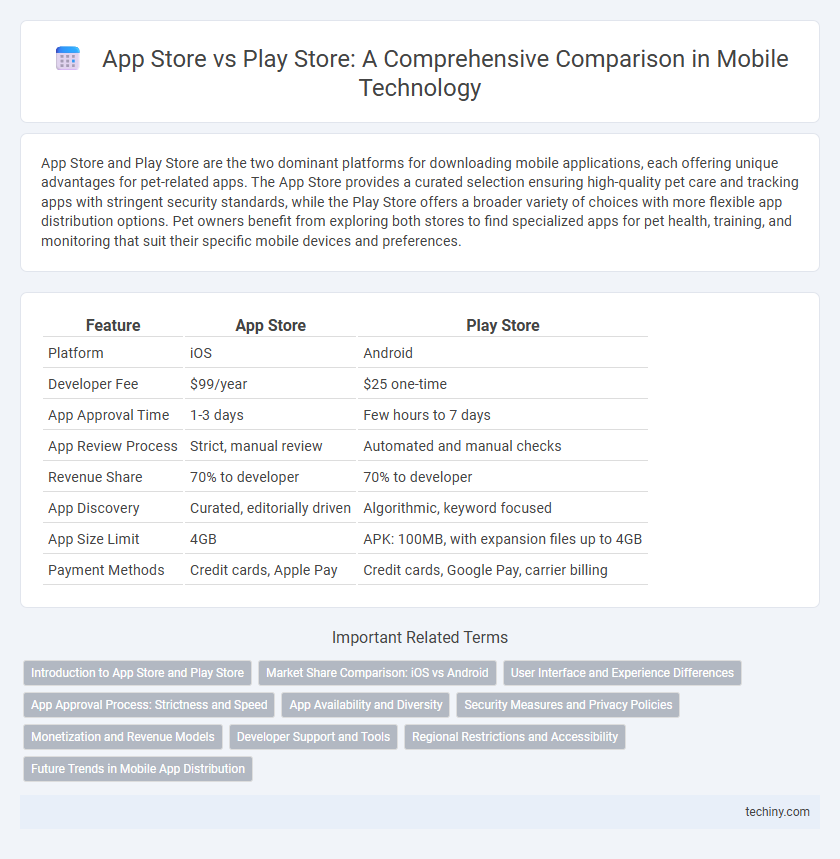App Store and Play Store are the two dominant platforms for downloading mobile applications, each offering unique advantages for pet-related apps. The App Store provides a curated selection ensuring high-quality pet care and tracking apps with stringent security standards, while the Play Store offers a broader variety of choices with more flexible app distribution options. Pet owners benefit from exploring both stores to find specialized apps for pet health, training, and monitoring that suit their specific mobile devices and preferences.
Table of Comparison
| Feature | App Store | Play Store |
|---|---|---|
| Platform | iOS | Android |
| Developer Fee | $99/year | $25 one-time |
| App Approval Time | 1-3 days | Few hours to 7 days |
| App Review Process | Strict, manual review | Automated and manual checks |
| Revenue Share | 70% to developer | 70% to developer |
| App Discovery | Curated, editorially driven | Algorithmic, keyword focused |
| App Size Limit | 4GB | APK: 100MB, with expansion files up to 4GB |
| Payment Methods | Credit cards, Apple Pay | Credit cards, Google Pay, carrier billing |
Introduction to App Store and Play Store
The App Store and Play Store serve as the primary digital marketplaces for iOS and Android applications, respectively. The App Store, operated by Apple, offers a curated selection of apps optimized for iPhone and iPad devices, emphasizing quality and security through strict review processes. Google Play Store, managed by Google, provides a broader range of applications with a more open submission policy, catering to a diverse Android user base worldwide.
Market Share Comparison: iOS vs Android
The App Store and Play Store dominate the mobile application market, with Google Play holding approximately 70% of the global market share due to Android's widespread adoption across diverse devices. Apple's App Store commands about 30% of the market, appealing to a premium user base predominantly in North America and Western Europe. Revenue generation patterns reveal the App Store leads in user spending despite smaller market share, driven by higher in-app purchase rates and subscription services.
User Interface and Experience Differences
The App Store features a sleek, minimalist design emphasizing curated content and editorial recommendations, enhancing discoverability for iOS users. In contrast, the Play Store offers a customizable interface with adaptive widgets and broader category options, catering to Android users seeking flexibility. User experience in the App Store prioritizes simplicity and polished visuals, whereas the Play Store focuses on versatility and personalized navigation.
App Approval Process: Strictness and Speed
The App Store enforces a more stringent app approval process, emphasizing security, quality, and design guidelines, which can result in longer review times compared to the Play Store. Google Play's approval is generally faster and more automated, allowing developers to publish updates and new apps with minimal delay. Despite differences in strictness and speed, both platforms prioritize user safety and app performance to maintain ecosystem integrity.
App Availability and Diversity
The Apple App Store offers a curated selection of over 1.8 million apps, emphasizing quality and security, while the Google Play Store boasts a broader catalog with more than 3.5 million apps, catering to diverse user preferences and global markets. Developers benefit from the Play Store's flexible submission policies, promoting a wider range of app categories and innovative features. Both platforms continuously expand their ecosystems, but the Play Store leads in app diversity and availability across different regions and devices.
Security Measures and Privacy Policies
App Store enforces strict app review guidelines and robust encryption to protect user data, while regularly updating privacy policies to meet global standards. Play Store employs Google Play Protect, using machine learning to scan apps for malware and offering granular user permission controls. Both platforms prioritize user security but differ in their approach to app vetting and privacy transparency.
Monetization and Revenue Models
The App Store generates higher revenue through premium app sales and in-app purchases, benefiting from a user base with greater average spending power. Play Store relies heavily on ad-driven monetization and freemium models, attracting a broader audience but yielding lower per-user revenue. Subscription services are growing on both platforms, yet the App Store consistently outperforms in total monetization value.
Developer Support and Tools
App Store offers a comprehensive suite of developer tools including Xcode, Swift Playgrounds, and extensive APIs for seamless integration across Apple devices, enhancing app performance and user experience. Play Store provides robust support through Android Studio, an open-source platform with flexible SDKs and extensive customization options that cater to diverse hardware configurations and user bases. Both platforms emphasize developer resources, but App Store excels in ecosystem integration while Play Store leads in flexibility and reach.
Regional Restrictions and Accessibility
The App Store enforces regional restrictions based on Apple's geographic licensing agreements, limiting app availability according to user location, which can affect access to certain content or services. Play Store offers broader regional access but still imposes restrictions tied to local laws and developer settings, influencing app visibility and download options. Users often need to switch regions or use VPNs to bypass these constraints, impacting overall accessibility and user experience in mobile app distribution.
Future Trends in Mobile App Distribution
The future of mobile app distribution will see increased integration of AI-driven personalization and advanced machine learning algorithms in both App Store and Play Store, enhancing app discoverability and user experience. Growth in alternative app delivery methods such as Progressive Web Apps (PWAs) and direct downloads will challenge traditional app store dominance by offering faster updates and improved accessibility. Privacy regulations and blockchain technology adoption will drive more transparent, secure transactions and decentralized app marketplaces, reshaping how users acquire mobile applications.
App Store vs Play Store Infographic

 techiny.com
techiny.com